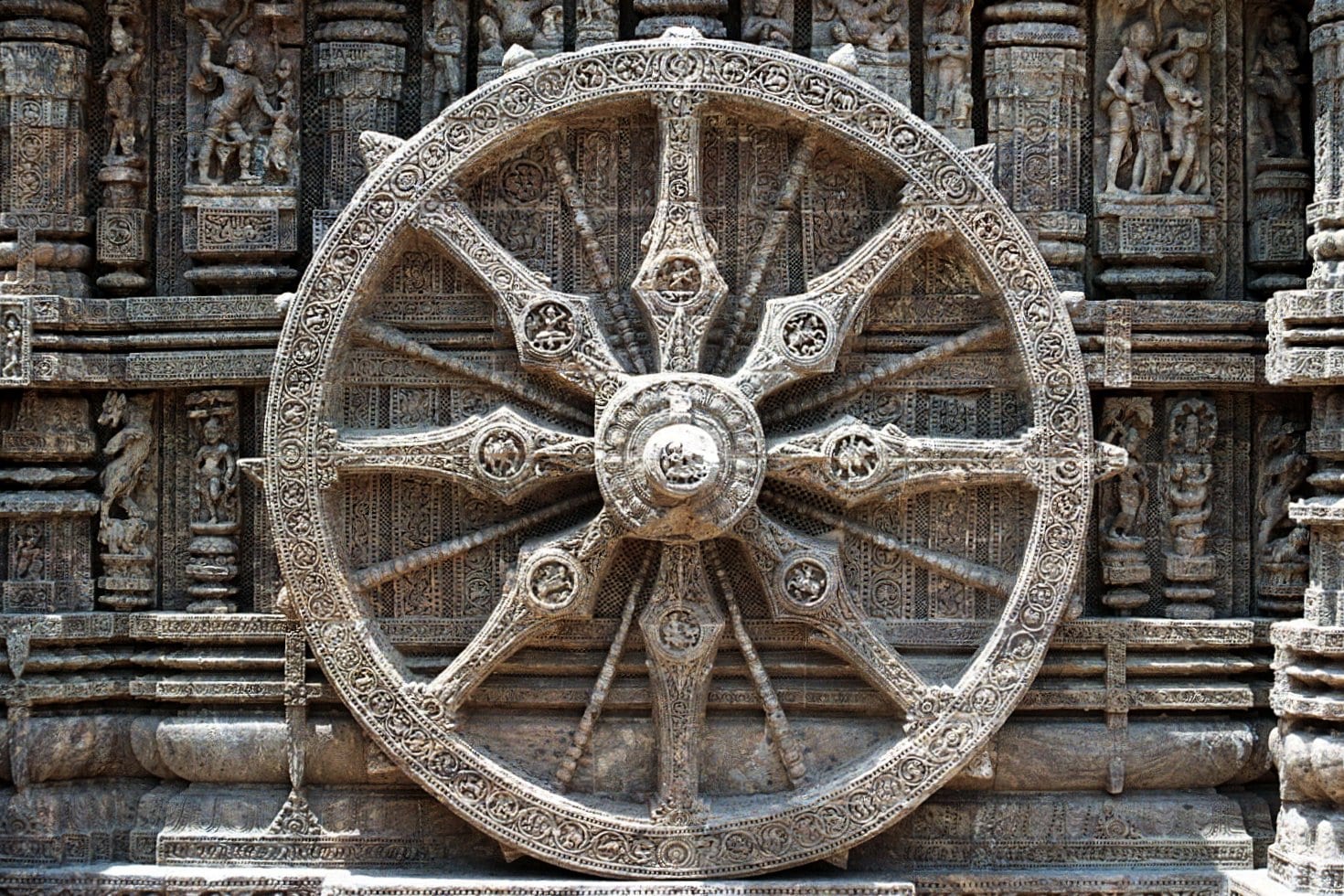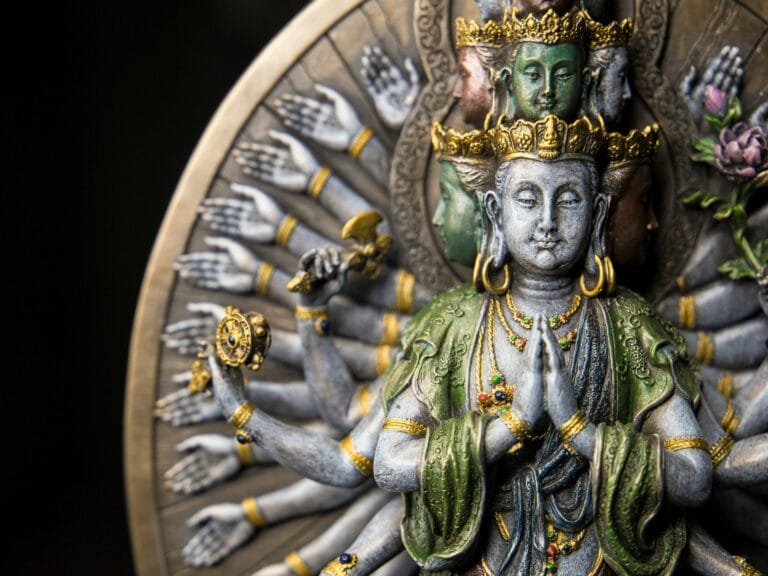Today we live in a time of great crisis, confronted by the gravest challenge that humanity has ever faced: the ecological consequences of our own collective karma. The scientific consensus is overwhelming: human activity is triggering environmental breakdown on a planetary scale. Global warming, in particular, is happening much faster than previously predicted, most obviously at the North Pole. For hundreds of thousands of years, the Arctic Ocean has been covered by an area of sea-ice as large as Australia—but now this is melting rapidly. In 2014 the Intergovernmental Panel on Climate Change (IPCC) forecast that the Arctic may be free of summer sea ice by mid-century. Other senior scientists consider this may happen within a decade.
Glaciers all over the world are also receding quickly. If current economic policies continue, the glaciers of the Tibetan Plateau, source of the great rivers that provide water for billions of people in Asia, are likely to disappear by mid-century. Severe droughts and crop failures are already affecting many countries. Major reports—from the IPCC, United Nations, European Union, and International Union for Conservation of Nature—agree that, without a collective change of direction, dwindling supplies of water, food and other resources could create widespread famine conditions, resource battles, and mass migration by mid-century—by 2030, according to the U.K.’s chief scientific advisor.
Global warming plays a major role in other ecological crises, including the loss of many plant and animal species that share this Earth with us. Oceanographers report that half the carbon released by burning fossil fuels has been absorbed by the oceans, increasing their acidity by about 30%. Acidification is disrupting calcification of shells and coral reefs, as well as threatening plankton growth, the source of the food chain for most life in the sea.
Eminent biologists and U.N. reports concur that “business-as-usual” will drive half of all species on Earth to extinction within this century. Collectively, we are violating the first precept—“do not harm living beings”—on the largest possible scale. And we cannot foresee the biological consequences for human life when so many species that invisibly contribute to our own well-being vanish from the planet.
Many scientists have concluded that the survival of human civilization is at stake. We have reached a critical juncture in our biological and social evolution. There has never been a more important time in history to bring the resources of Buddhism to bear on behalf of all living beings. The four noble truths provide a framework for diagnosing our current situation and formulating appropriate guidelines—because the threats and disasters we face ultimately stem from the human mind, and therefore require profound changes within our minds. If personal suffering stems from craving and ignorance—from the three poisons of greed, ill will, and delusion—the same applies to the suffering that afflicts us on a collective scale. Our ecological emergency is a larger version of the perennial human predicament. Both as individuals and as a species, we suffer from a sense of self that feels disconnected not only from other people but from the Earth itself. As Thích Nhất Hạnh has said, “We are here to awaken from the illusion of our separateness.” We need to wake up and realize that the Earth is our mother as well as our home—and in this case the umbilical cord binding us to her cannot be severed. When the Earth becomes sick, we become sick, because we are part of her.
Our present economic and technological relationships with the rest of the biosphere are unsustainable. To survive the rough transitions ahead, our lifestyles and expectations must change. This involves new habits as well as new values. The Buddhist teaching that the overall health of the individual and society depends upon inner well-being, and not merely upon economic indicators, helps us determine the personal and social changes we must make.
Individually, we must adopt behaviors that increase everyday ecological awareness and reduce our “carbon footprint”. Those of us in the advanced economies need to retrofit and insulate our homes and workplaces for energy efficiency; lower thermostats in winter and raise them in summer; use high efficiency light bulbs and appliances; turn off unused electrical appliances; drive the most fuel-efficient cars possible, and reduce meat consumption in favor of a healthy, environmentally-friendly plant-based diet.
These personal activities will not by themselves be sufficient to avert future calamity. We must also make institutional changes, both technological and economic. We must “de-carbonize” our energy systems as quickly as feasible by replacing fossil fuels with renewable energy sources that are limitless, benign and harmonious with nature. We especially need to halt the construction of new coal plants, since coal is by far the most polluting and most dangerous source of atmospheric carbon. Wisely utilized, wind power, solar power, tidal power, and geothermal power can provide all the electricity that we require without damaging the biosphere. Since up to a quarter of world carbon emissions result from deforestation, we must reverse the destruction of forests, especially the vital rainforest belt where most species of plants and animals live.
It has recently become quite obvious that significant changes are also needed in the way our economic system is structured. Global warming is intimately related to the gargantuan quantities of energy that our industries devour to provide the levels of consumption that many of us have learned to expect. From a Buddhist perspective, a sane and sustainable economy would be governed by the principle of sufficiency: the key to happiness is contentment rather than an ever-increasing abundance of goods. The compulsion to consume more and more is an expression of craving, the very thing the Buddha pinpointed as the root cause of suffering.
Instead of an economy that emphasizes profit and requires perpetual growth to avoid collapse, we need to move together towards an economy that provides a satisfactory standard of living for everyone while allowing us to develop our full (including spiritual) potential in harmony with the biosphere that sustains and nurtures all beings, including future generations. If political leaders are unable to recognize the urgency of our global crisis, or unwilling to put the long-term good of humankind above the short-term benefit of fossil-fuel corporations, we need to challenge them with sustained campaigns of citizen action.
Dr James Hansen of NASA and other climatologists have recently defined the precise targets needed to prevent global warming from reaching catastrophic “tipping points.” For human civilization to be sustainable, the safe level of carbon dioxide in the atmosphere is no more than 350 parts per million (ppm). This target has been endorsed by the Dalai Lama, along with other Nobel laureates and distinguished scientists. Our current situation is of profound concern since the level is already 400 ppm, and has been rising at 2 ppm per year. We are challenged not only to reduce carbon emissions, but also to remove large quantities of carbon gas already present in the atmosphere.
As signatories to this statement of Buddhist principles, we acknowledge the urgent challenge of climate change. We join with the Dalai Lama in endorsing the 350 ppm target. In accordance with Buddhist teachings, we accept our individual and collective responsibility to do whatever we can to meet this target, including (but not limited to) the personal and social responses outlined above.
We have a brief window of opportunity to take action, to preserve humanity from imminent disaster and to assist the survival of the many diverse and beautiful forms of life on Earth. Future generations, and the other species that share the biosphere with us, have no voice to ask for our compassion, wisdom, and leadership. We must listen to their silence. We must be their voice, too, and act on their behalf.
Endorsements
Dharma Teacher/Scholar Signatories (2009)
These are the signatories in 2009 to the original Buddhist Declaration on Climate Change As published on the website of Ecobuddhism.org (and with permission to republish here). The Declaration was endorsed by 65 Dharma teachers, scholars and leaders, based in 13 countries, from the Tibetan, Zen, Theravadin, Vipassana, Chan and general Buddhist traditions. These leaders were joined by 150 senior abbots and lineage heads from many monasteries across the Himalayan region, at a Tibetan Buddhist conference led by the Dalai Lama in Delhi at the end of November 2009.
See the full list of endorsements, including those to the 2015 version submitted in Paris, and those from 2,354 One Earth Sangha members.
| Dalai Lama XIV | Tibetan Buddhist, India |
| Gyalwang Karmapa XVII | Tibetan Buddhist, India |
| Ven. Kobutsu Malone | Zen, USA |
| Joan Hallifax Roshi | Zen, USA |
| Ven. Karma Lekshe | Tibetan Buddhist, USA |
| Daniel Terragno Roshi | Zen, USA |
| Rev. Meiko Jones | Zen, USA |
| Dr John Crook Shifu | Chan, UK |
| Dr. Peter Fenner | Author/Scholar, USA |
| Rev. Danny Fisher | Buddhist Chaplain, USA |
| Jiun Eric Rommeluere | Zen, France |
| Ven. Bhatsakorn Piyobhaso | Theravada,Thailand |
| Pat Enkyo O’Hara Roshi | Zen, USA |
| Hozan Alan Senauke Roshi | Zen, USA |
| Rev Craig Langsdorf | Zen, USA |
| Ayya Tathaaloka Bhikkhuni | Theravada, USA |
| Jiyo Andrew Agacki | Buddhist Minister, USA |
| Amala Wrightson Sensei | Zen, New Zealand |
| Ven. Orgyen Namgyal | Tibetan Buddhist, USA |
| Rev Bonnie Beverage | Zen/Theravada, USA |
| Kathleen Seiun Reiley | Zen, USA |
| Rev. Taigen Dan Leighton | Zen, USA |
| Santikaro Bhikkhu | Theravada, USA |
| Ruben Keiun Habito Roshi | Zen, USA |
| Ven. Bhikkhu Bodhi | Theravada, USA |
| Joseph Goldstein | Vipassana, USA |
| Ven. Losang Gendun | Tibetan Buddhist, France |
| Ven Lobsang Thubten | Tibetan Buddhist, USA |
| Tsultrim Lama | Tibetan Buddhist, USA |
| Prof. Anne Klein | Author/Scholar, USA |
| Susan Ji-On Postal Roshi | Zen, USA |
| Dr Joanna Macy | Author/Scholar, USA |
| Father Ama Samy SJ | Zen, India |
| Lawrence Ellis | Scholar/Author, USA |
| Ringu Tulku Rinpoche | Tibetan Buddhist, Sikkim |
| Lin Jensen | Zen, Author, USA |
| Mu Soeng | Author/Scholar, USA |
| David Tetsuun Loy | Zen, Author, USA |
| Gyurme Dorje | Author/Scholar, UK |
| Jan Chozen Bays Roshi | Zen, USA |
| Sensei Daishin Brighton | Zen, USA |
| Jim Scott | Scholar, Denmark |
| Ayang Rinpoche | Tibetan Buddhist, India |
| Palchen Galo Rinpoche | Tibetan Buddhist, India |
| Lama Sonam Dorjee | Tibetan Buddhist, India |
| Lama Sangye Dorje | Tibetan Buddhist, Argentina |
| Rev. Wadinagala Pannaloka | Theravada, Taiwan |
| Lama Norbu Repa | Tibetan Buddhist, Belgium |
| Ken Jones | Author/Scholar, UK |
| Dr. Jason Wirth | Scholar/Author, USA |
| Lama Karma Lodro Zangmo | Tibetan Buddhist, USA |
| Lama Yeshe Losal Rinpoche | Tibetan Buddhist, UK |
| Sherab Palden Beru | Master Thangka Painter, UK |
| Melissa Myozen Blacker Sensei | Zen, USA |
| James Myoun Ford Roshi | Zen, USA |
| David Dayan Rynick Sensei | Zen, USA |
| Dzigar Kongtrul Rinpoche | Tibetan Buddhist, USA |
| Lama Denys Rinpoche | Tibetan Buddhist, France |
| Prof. Bikiran Prasad Barua | Scholar, Bangladesh |
| Susan Murphy Roshi | Zen, Australia |
| B. Allan Wallace | Tibetan Buddhist, USA |
| Lama Jigme Chokyi Lodro | Tibetan Buddhist, Canada |
| Lama Chonam | Tibetan Buddhist, USA |
| Sangye Khandro | Tibetan Buddhist, USA |








One Response
Thank You for this profound call to arms in saving our planet and it’s inhabitants from the disaster of climate change !